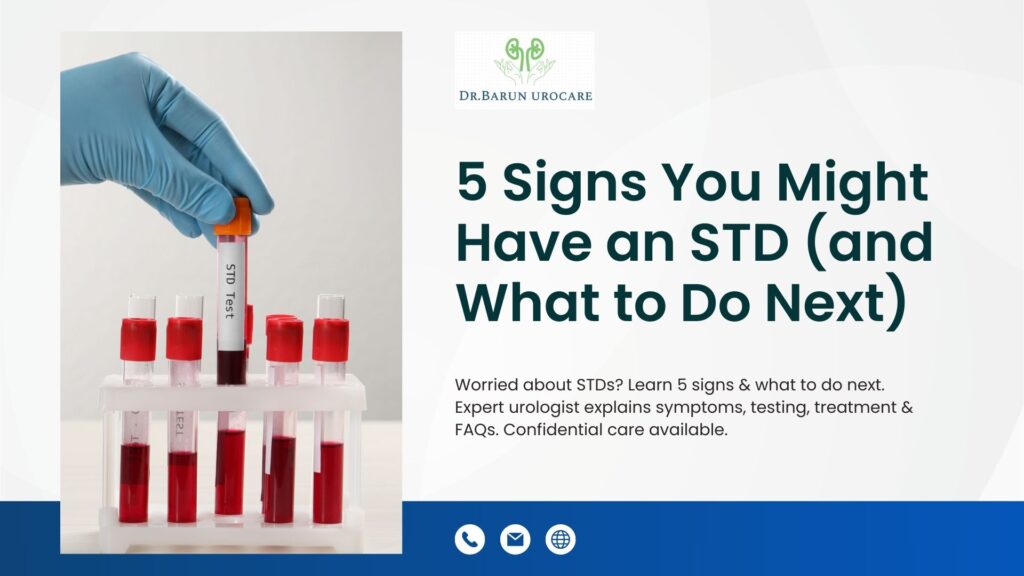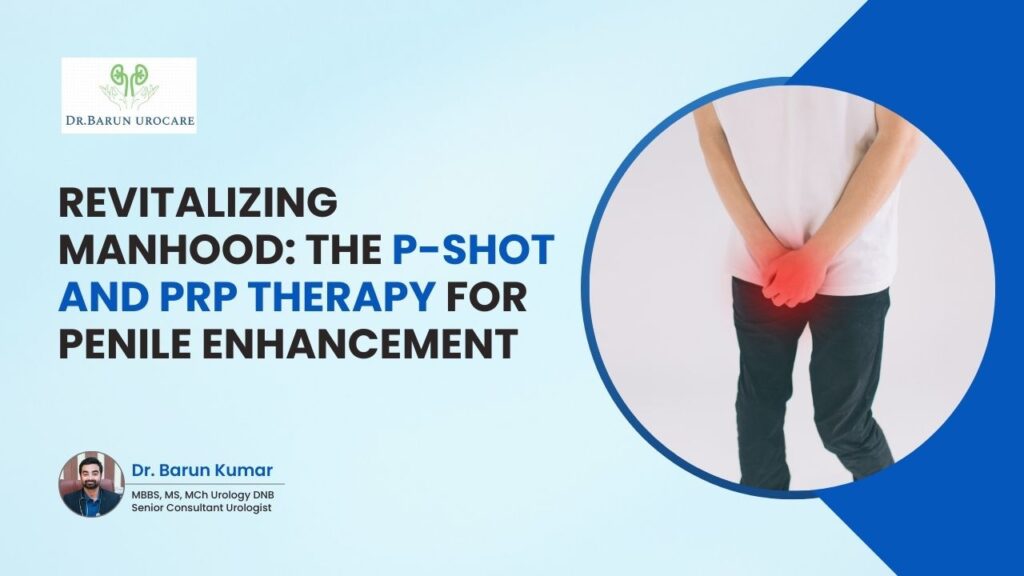As a urologist, I often see patients who are concerned about their sexual health. Sexually transmitted diseases (STDs), also known as sexually transmitted infections (STIs), are a common worry, and it’s perfectly understandable. In fact, statistics from the National AIDS Research Institute (NARI) suggest that a significant portion of the adult population in India is infected with an STD annually.
Today, I want to talk openly and honestly about STDs. Specifically, I’ll discuss five signs that might indicate you have an STD and what steps to take if you’re experiencing any of them. Remember, early diagnosis and treatment are key to preventing complications. Let’s get started!
5 Signs You Might Have an STD
While STDs sometimes cause no symptoms at all, there are definitely some red flags to watch out for. Here are five signs that might indicate you have an STD:
1. Unusual Discharge
A healthy discharge from the vagina is typically clear or white and odorless. However, if you notice a discharge that’s yellow, green, or gray, has a strong odor, or is thicker than usual, it could be a sign of an STD like chlamydia, gonorrhea, or trichomoniasis. Men may also experience unusual discharge from the penis, which can be clear, milky, or pus-like.
2. Genital Sores, Warts, or Rashes
The appearance of bumps, sores, or rashes in your genital area can be alarming, and rightly so. These can be caused by various STDs, including herpes, syphilis, and genital warts. The sores can vary in size, shape, and pain level, so it’s important to see a doctor for proper diagnosis.
3. Painful Urination or Intercourse
Burning or stinging during urination is a common symptom of STDs like chlamydia and gonorrhea. Pain during sexual intercourse can also be a sign of an STD, but it’s important to remember it can have other causes as well. If you’re experiencing any pain, it’s best to consult a doctor to get a diagnosis.
4. Pelvic Pain or Lower Abdominal Pain
Women, especially, may experience pelvic or lower abdominal pain as a sign of an STD. This pain can be dull or sharp and may worsen during certain activities. While other conditions can cause pelvic pain too, it’s important to rule out STDs as a possible culprit.
5. Bleeding Between Periods or After Sex
Unexpected vaginal bleeding, particularly outside your menstrual cycle or after using hormonal birth control, can be a sign of an underlying issue, including an STD. If you experience any unexplained bleeding, don’t hesitate to see a doctor to determine the cause.
Addressing Common Concerns in India
Let’s talk about some specific concerns I often hear from patients here in India. First, it’s important to acknowledge that there can be a social stigma surrounding STDs. This can make people hesitant to get tested or seek treatment. However, I want to assure you that all consultations and testing are completely confidential.
Second, some patients worry about the cost of STD testing and treatment. The good news is that many government hospitals in India offer free and confidential STD testing services. It’s always best to check with your local public health department or healthcare provider for details on available resources.
Remember, early diagnosis and treatment are crucial for preventing complications from STDs. The sooner you get tested, the sooner you can get the treatment you need and protect your long-term health.
What to Do Next
If you’re experiencing any of the signs mentioned above, the most important step is to get tested. Early diagnosis and treatment of STDs are crucial for preventing complications and protecting your long-term health. Here’s what you can do:
- Schedule an appointment with your doctor or a urology clinic. They can perform a thorough examination and recommend the appropriate STD tests based on your symptoms.
- Be honest and open with your doctor about your sexual history. This information is vital for an accurate diagnosis and will be kept confidential.
- Don’t delay seeking help. The longer you wait, the higher the risk of complications. Remember, most STDs are treatable, and early intervention is key.
While I can’t provide specific medical advice through this blog, I’m here to be a resource. If you have any questions or concerns, please don’t hesitate to call us at 062899 58022 and schedule an appointment to discuss your individual situation.
Conclusion
Sexual health is an important part of overall well-being. By practicing safe sex and getting tested regularly, you can significantly reduce your risk of contracting an STD. If you have any concerns, please talk to your doctor. Open communication is key to maintaining good sexual health.
Remember, you’re not alone. STDs are more common than you might think, and there’s no shame in getting tested. Early diagnosis and treatment are essential for a healthy future. I hope this blog has been informative. Take care!
FAQ: Your Questions About STDs Answered
Here are some frequently asked questions I hear from patients in India about STDs:
1. Can I get an STD even if I don’t have any symptoms?
Absolutely. Many STDs, especially in the early stages, can present with no noticeable symptoms. This is why regular testing is crucial, especially if you are sexually active.
2. Are there any home tests available for STDs?
While there are some home testing kits available in India, I highly recommend consulting a doctor for proper diagnosis and treatment. Home tests may not be as accurate as those performed by a healthcare professional.
3. What happens if I test positive for an STD?
Don’t panic! Most STDs are treatable with antibiotics or medications. Early diagnosis and treatment are key to preventing complications. Your doctor will discuss the best course of treatment based on the specific STD you have.
4. Will my partner need to get tested too?
In most cases, yes. It’s important for your partner(s) to get tested as well to prevent further spread of the infection. Your doctor can advise you on how to talk to your partner(s) about getting tested.
5. Can I get an STD from oral sex or other forms of sexual contact?
Yes, some STDs can be transmitted through oral sex, anal sex, or even sharing sex toys. The safest way to prevent STDs is to practice safe sex by using condoms consistently and correctly.
6. I’m worried about the cost of STD testing and treatment. Are there any free options?
Many government hospitals in India offer free and confidential STD testing services. It’s always best to check with your local public health department or healthcare provider for details on available resources.
7. I’m embarrassed to talk to my doctor about STDs. What should I do?
Remember, doctors are there to help you maintain your health. All consultations and testing are completely confidential. Don’t hesitate to speak openly and honestly with your doctor about your concerns. Early diagnosis and treatment are crucial for your well-being.
8. How can I protect myself from STDs?
The most effective way to prevent STDs is to practice safe sex. This includes using condoms consistently and correctly every time you have sex. Additionally, limiting your number of sexual partners and being in a mutually monogamous relationship with someone who has been tested and is STD-free can also reduce your risk.
If you have any further questions or concerns, please don’t hesitate to call us at 062899 58022 and schedule an appointment to discuss your individual situation.



